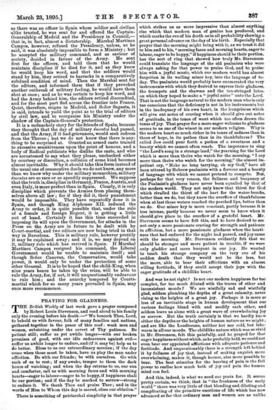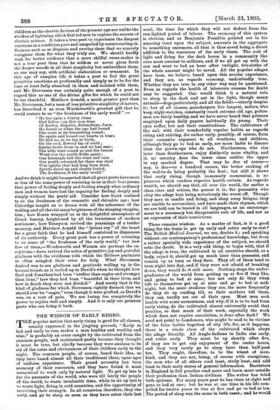PRAYING FOR GLADNESS. T HE British Weekly of last week gave
a prayer composed by Robert Louis Stevenson, and read aloud to his family only the evening before his death :—" We beseech Thee, Lord, to behold us with favour, folk of many families and nations, gathered together in the peace of this roof : weak men and women, subsisting tinder the covert of Thy patience. Be patient still; suffer us yet awhile longer—with our broken promises of good, with our idle endeavours against evil— suffer us awhile longer to endure, and (if it may be) help us to do better. Bless to us our extraordinary mercies ; if the day come when these must be taken, have us play the man under affliction. Be with our friends ; be with ourselves. Go with each of us to rest ; if any awake, temper to them the dark hours of watching ; and when the day returns to us, our sun and comforter, call us with morning faces and with morning hearts—eager to labour—eager to be happy, if happiness shall be our portion ; and if the day be marked to sorrow—strong to endure it. We thank Thee and praise Thee ; and in the words of Him to Whom this day is sacred, close our oblation."
There is something of patriarchal simplicity in that prayer
which strikes us as more impressive than almost anything else which that modern man of genius has produced, and which marks the eve of his death as in all probability showing a great personal advance on the day of his birth. Especially that prayer that the morning might bring with it, as we trust it did to him and to his, "morning faces and morning hearts, eager to labour, eager to be happy," if happiness should be their portion, has the sort of ring that showed how truly Mr. Stevenson could translate the language of the old psalmists who were always asking for that power to praise God, and to praise him with a joyful music, which our modern world has almost forgotten in its wailing minor key, into the language of to- day. The psalmists would probably have enumerated the very instruments with which they desired to express their gladness, the trumpets and the shawms and the ten-stringed lutes, on which they hoped to make a " joyful noise" unto the Lord. That is not the language natural to the modern man who is only too conscious that the deficiency is not in his instruments but in the inadequacy of his own heart, in the hungriness which will give out notes of craving when it should give out notes of gratitude, in the tones of want which too often drown the tones of joy. That prayer for a more eager welcome to gladness seems to us one of the wisest in our modern religion. Why is the modern heart so much richer in its tones of sadness than in those of hope, in its pathos than in its thankfulness P The exiled Jew could pour forth a pathos of a sweetness and a beauty which we cannot often reach. The impotence to sing "the Lord's song in a strange land," the yearning for the Lord which is more than theirs who watch for the morning, "I say more than theirs who watch for the morning," the almost im- patient cry, "Make no long tarrying, oh my God," have all been uttered by Hebrew psalmists with a fervour and a beauty of language with which we cannot pretend to compete. But, perhaps for that very reason, the fullness and buoyancy of the Psalmist's gladness have never been equalled by that of the modern world. They not only knew that thirst for God which rivalled the thirst of the hart for the water-brooks, better than we do, but they knew the overflow of thankfulness when at last those waters reached the parched lips, better than we do. Our minor key is more constant, partly because it is less intense, partly because we never seem to know when it should give place to the overflow of a grateful heart. Mr. Stevenson seems to have felt this, and to have desired to see not only a more passionate craving for strength and patience in affliction, but a more passionate gladness when the heavi- ness that had endured for the night had passed, and joy came with the morning. Mr. Stevenson evidently felt that we should be stronger and more patient in trouble, if we were only gladder and more buoyant in our joy. He wanted to teach his strange company on the very eve of his sudden death that they would not be the less, but the more, able to bear their afflictions with an almost willing fortitude, if they could accept their joys with the eager gratitude of a childlike heart.
And was he not right ? Is not our modern happiness far too complex, far too much diluted with the traces of other and inconsistent moods ? We are wistfully sad and wistfully glad, seldom plumbing the depths of a great calamity, never rising to the heights of a great joy. Perhaps it is more or less of an inevitable stage in human development that our various feelings blend with and modify each other, and seldom leave us alone with a great wave of overwhelming joy or sorrow. But the truth certainly is that we hardly know either the depths or the heights of human nature as we might ; and are like the Laodiceans, neither hot nor cold, but luke- warm in all our moods. The childlike nature which was so vivid in Mr. Stevenson, felt this painfully, and ha prayed for that eager happiness without which, as he probably held, we could not even bear our appointed afflictions with adequate patience and fortitude. And unquestionably there is a strength left behind it by fullness of joy that, instead of making anguish more overwhelming, makes it, though keener, also more possible to bear. The beet stimulus for the bearing of pain is the full power to realise how much both of joy and pain the human mind can feeL And this, indeed, is what we need our poets for. It seems pretty certain, we think, that in "the freshness of the early world" there was very little of that blending and diluting and complicating of the primitive emotions of life which has now advanced so far that ordinary men and women are as unlike
children as the electric devices of the present age are unlike the strokes of lightning which first led men to explore the secrets of electric science. It takes a true poet to experience the deepest emotions in a condition pure and unspoiled by counteracting in- fluences such as so disguise and overlay them that we scarcely recognise them for what they truly are. We should hardly wish for better evidence that a mere skilful verse-maker is not a true poet than that he seldom or never gives forth the deeper moods in all their simplicity bat embroiders them, as one may say, with artificial elaboration or ornament. In this age of complex life it takes a poet to feel the great primitive emotions so profoundly and simply as to be for the time at least fully absorbed in them and isolated with them, and Mr. Stevenson was certainly quite enough of a poet to regard this as one of the divine gifts for which he could not be too thankful. Matthew Arnold, a much greater poet than Mr. Stevenson, but a man of less primitive simplicity of nature, has described it as even Wordsworth's greatest gift that he could restore to us "the freshness of the early world "
He too upon a wintry clime Had fallen—on this iron time Of doubts, disputes, distractions, fears.
He found us when the age had bound Our souls in its benumbing round; He spoke and loosed our hearts in tears.
He laid us, as we lay at birth, On the cool, flowery lap of earth ; Smiles broke from us and we bad ease ; The hills were round us and the breeze
Went o'er the sunlit fields again;
Our foreheads felt the wind and rain.
Our youth returned for there was shed O'er spirits that had long been dead, Spirits dried up and closely furled, The freshness of the early world."
And we think it might be asserted that all great poets have more or less of the same power of restoring thus in their best poems that power of feeling deeply and feeling simply what ordinary men and women have lost the capacity for feeling deeply and simply without the poets' aid. Consider how Scott realised to us the freshness of the romantic and chivalric age ; how Coleridge taught us to dream with all the coherence of the waking, and all the visionary brightness of the sleeping imagine_ tion ; how Keats wrapped us in the delightful atmosphere of Greek beauty, heightened by all the luxuriance of modern sentiment ; how Tennyson revived the yearnings of a tender memory, and Matthew Arnold the "lyrical cry" of the heart for a great faith that he had himself contrived to dispossess of its authority. Every great poet has a power of restoring to us some of "the freshness of the early world," but how few of them,—Wordsworth and Watson are perhaps the ex- ceptions,—have revived the notes of primitive joy and grateful gladness with the vividness with which the Hebrew psalmists so often mingled their cries for help. What Stevenson desired was to see gladness and gratitude welling up in the human breast, as it welled up in David's when he thought how Saul and Jonathan had been "swifter than eagles and stronger than lions," how they had been "beautiful in their lives, and how in death they were not divided." And surely that is the kind of gladness for which Stevenson rightly deemed that we should ever be "eager," even though it were grafted, as David's was, on a root of pain. We are losing too completely the power to rejoice well and simply. And it is only our greatest poets who can bring it back.







































 Previous page
Previous page